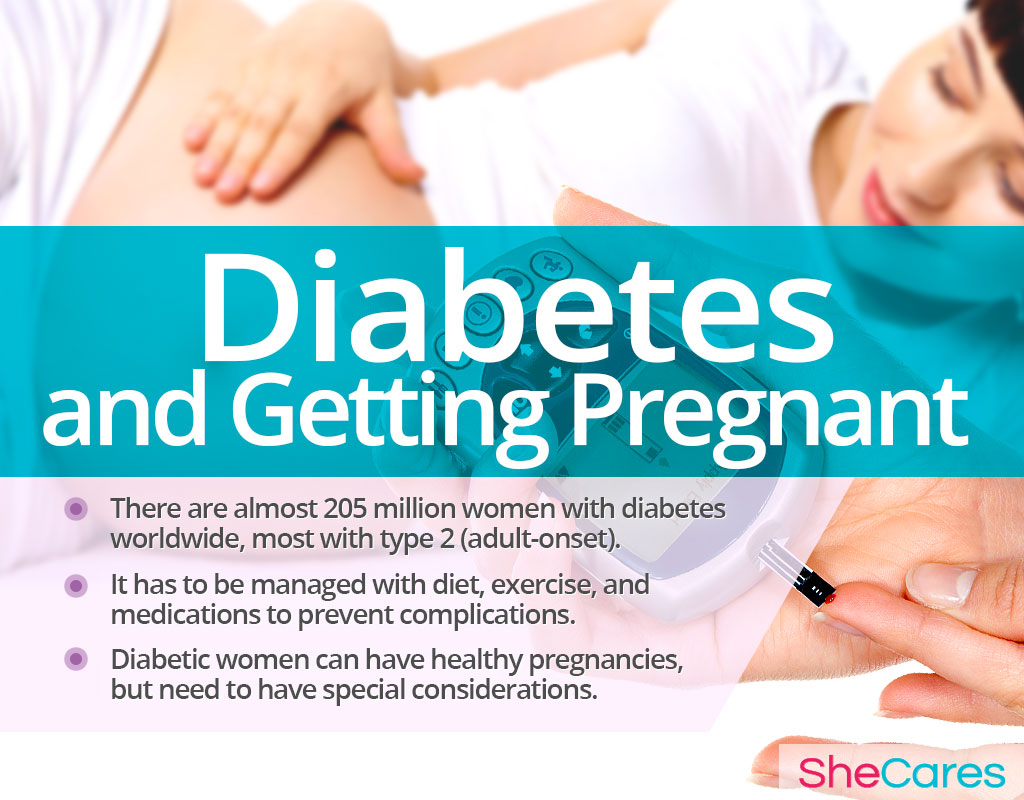Brief Overview of Diabetes
Diabetes is a condition characterized by abnormally high blood sugar levels, which result from a disruption in the production or utilization of insulin. Created by the pancreas, insulin is a hormone that enables glucose from food to be absorbed by the cells and helps maintain its stable amounts in the blood.
There are two main types of diabetes: type 1, when the pancreas does not make insulin, and type 2, when insulin is made, but the body cannot properly utilize it. The exact causes of both types of diabetes are not known, but they are believed to be caused by a mix of genetic and environmental factors as well as certain lifestyle habits in the case of type 2 diabetes. For instance, a sedentary lifestyle and obesity are the most common risk factors for this type of the disease.
It is important to differentiate type 1 and type 2 diabetes from a third type, gestational diabetes, which is a temporary condition that happens to some women during their pregnancy and, in most cases, resolves on its own upon delivery.
Possible Effects of Uncontrolled Diabetes on Conception
Uncontrolled diabetes has been shown to negatively affect women's fertility and compromise their pregnancy in a variety of ways:
Effects of Diabetes on Fertility
Menstrual cycle abnormalities. High or low levels of sugar may cause an imbalance of key reproductive hormones, such as estrogen and progesterone, which might delay menarche (the first menstruation), deregulate individual menses, and cause premature menopause, thus shortening reproductive years and lowering the chances of conceiving.
Moreover, studies have shown that the majority of women with type 2 diabetes suffer from obesity, and they are more likely to develop a polycystic ovary syndrome (PCOS), both of which have been associated with lowering fertility rates.
Effects of Diabetes on the Mother and Baby
Diabetes can also have an effect on the mother and her growing baby throughout pregnancy. The levels of blood sugar in pregnancy are not only affected by the foods you eat, but also by the placental hormones. These hormones might have an anti-insulin activity, which, in turn, increases the insulin requirements that a woman has to satisfy in order to keep her disease at bay.
Additionally, morning sickness with vomiting - very common in early pregnancy - can make it harder to keep up with a medication regimen and ensure proper nutrition essential for the management of diabetes, thus potentially increasing the risk of pregnancy complications.
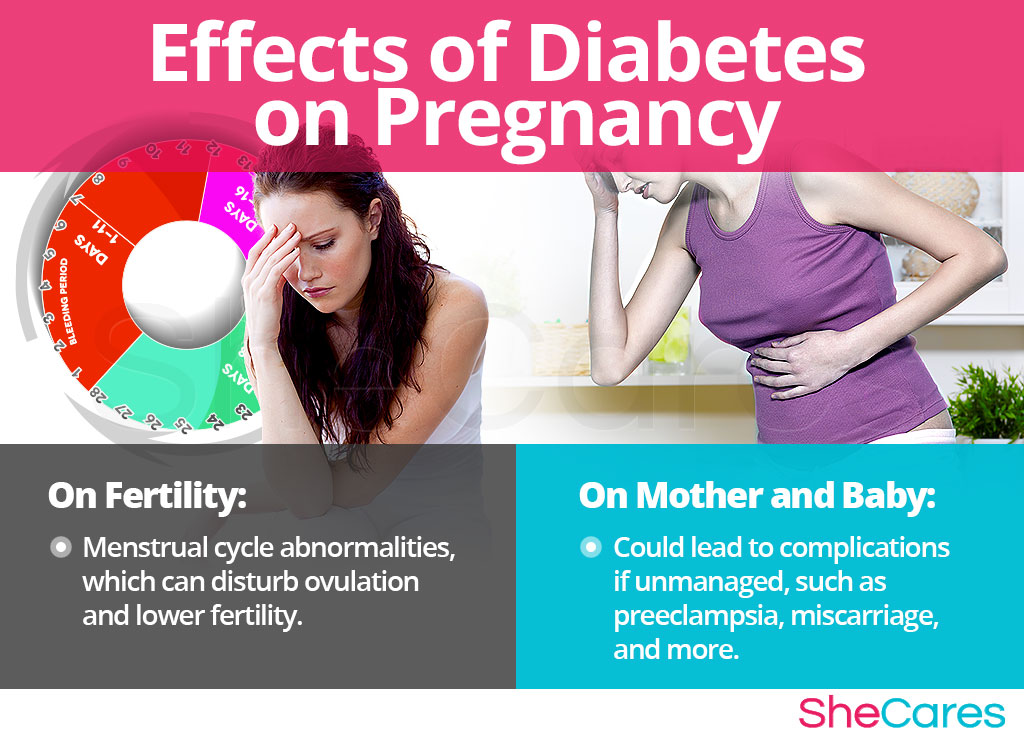
Risks and Complications
It's important to know that diabetes could not only significantly impair your chances of getting pregnant, but could also put the mother and her baby at risk for pregnancy complications, such as preeclampsia, delivery complications, premature birth, miscarriage, or stillbirth.
Action Plan
Work closely with your doctor to adjust your medications, if needed, and to develop an action plan that is adequate from preconception all the way until delivery.
Control Diabetes before Pregnancy
All preconception efforts will have a positive impact on the rest of the pregnancy. Ideally, they should begin three to six months before attempting to conceive, and they might include the following:
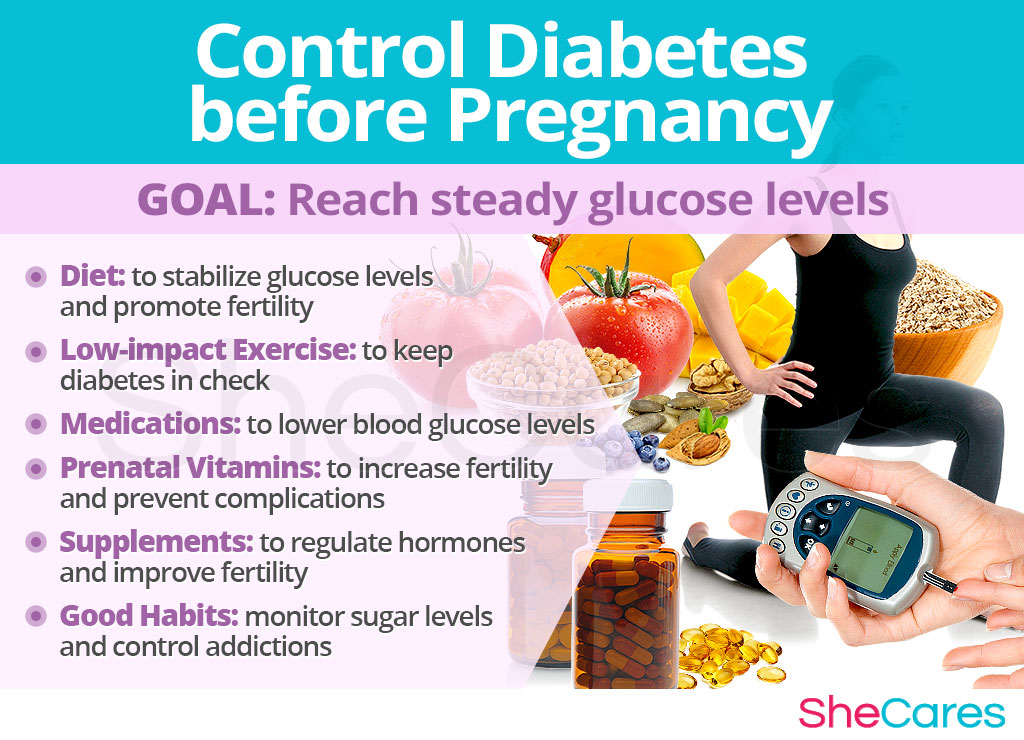
Healthy Diet
Your main goal is to reach steady glucose levels before getting pregnant. This involves three components: knowing what to eat, how much to eat, and when to eat it. Learning how to plan your meals ahead can help you achieve your diabetes and fertility goals.
What to Eat.
A good pregnancy diabetes diet incorporates foods friendly for diabetes and those that can have fertility-nourishing properties, such as phytoestrogenic foods, which can help regulate the menstrual cycle. These include:
- Phytoestrogenic foods, such as beans, garlic, oranges, and broccoli
- Non-starchy vegetables, such as Brussels sprouts, tomatoes, asparagus, and spinach
- Low-glycemic fruits, such as blueberries, strawberries, and mangoes
- Whole grains, like quinoa, whole grain faro, oats, and barley
- Seeds of sunflower, pumpkin, and chia; and Nuts, like almonds or walnuts
- Lean meats
- Yogurt
As with other foods, moderate consumption of phytoestrogens is advised.
How Much to Eat.
Consider using the Diabetes Plate Method, which involves using a 9-inch plate to fill as such:
- 50% of the plate with non-starchy vegetables
- 25% of the plate with protein
- 25% of the plate with complex carbohydrates, like brown rice
When to Eat.
Opt for a regular meal plan, which consists of small and nutritionally balanced portions that are spread evenly throughout the day to ensure stable glucose levels.
If you need help composing your diet, consult with a dietician, who can help you develop healthy eating habits that are beneficial for both diabetes and fertility.
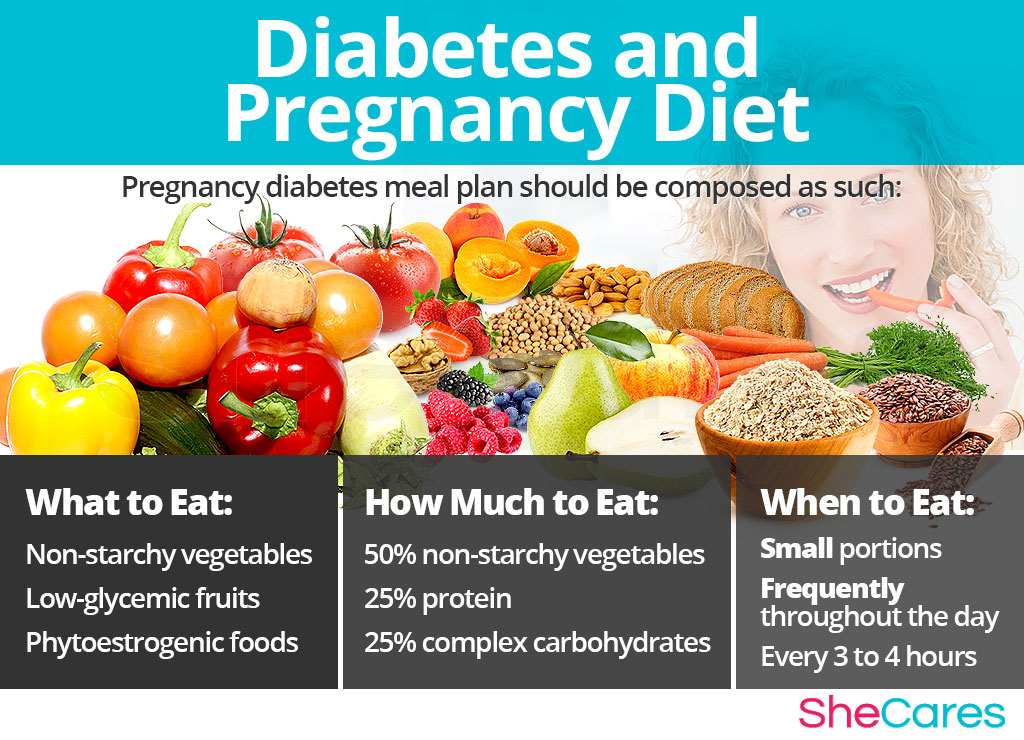
Adequate Exercise
Regular physical activity is highly recommended for diabetic women preparing for pregnancy because sedentary lifestyles can not only worsen diabetes, but also complicate conception and increase the risk of pregnancy complications. Remember that exercise is also important as a means to control obesity, which is a known risk factor for diabetes.
- Plan for 30 minutes a day of moderate-level activity, such as walking, spinning, swimming, or dancing, which can increase insulin sensitivity and optimize glucose absorption. Stay away from strenuous exercise as it might trigger insulin spikes, disrupting your menstrual cycle and fertility.
- You might also want to try exercises that promote relaxation and reduce stress, such as yoga, tai chi, or Pilates, because studies have shown that prolonged stress can negatively affect diabetes control and decrease your conception chances.
Good Habits
Frequent monitoring of your blood glucose levels is key to achieving your preconception action plan goals. Aim to keep your sugar at 70-110 mg/dL before meals and below 150 mg/dL one hour after eating.
Also, try to combat your addictions to cigarettes, alcohol, and illegal drugs as they might worsen your diabetes, lead to infertility, and cause numerous birth defects.
Vitamins and Supplements
Certain nutritional deficiencies have been linked to hormonal abnormalities and reproductive issues, such as poor egg quality, irregular menstruation, and more.
- Prenatal vitamins can increase your chances of conceiving, prevent birth defects, and ensure safe pregnancy. They include folic acid, iron, selenium, zinc, and vitamins B, C, D, and E. Read everything about prenatal vitamins.
- Hormone-regulating herbal supplements, such as Macafem, can help stabilize hormones, regulate the menstrual cycle, and increase your chances of conceiving. Also, hormonal balance could help with insulin sensitivity and improve diabetes.
Tips for Conceiving with Diabetes
Once you keep your diabetes in check, you'll have a green light to conceive. For some couples, it means getting pregnant within one ovulation period, while for most, conceiving a baby is a more time-consuming endeavor.
- Continue with your preconception action plan to keep your glucose steady and your conception chances high.
- Add more plant-based protein sources into your diet, such as beans and nuts, which have been found to increase ovulatory fertility.
- Try not to skip meals as hypoglycemia, which is a low blood sugar, can be harmful to you and the baby once you conceive.
- Maintain your vitamin regimen, especially iron and folic acid.
- Stay well hydrated as it improves cervical fluid consistency and helps with conception.
- Consider meditation, yoga, or breathing exercises to lower stress and anxiety, which might rise as you are trying to get pregnant.
- Limit caffeine intake and abstain from alcohol.
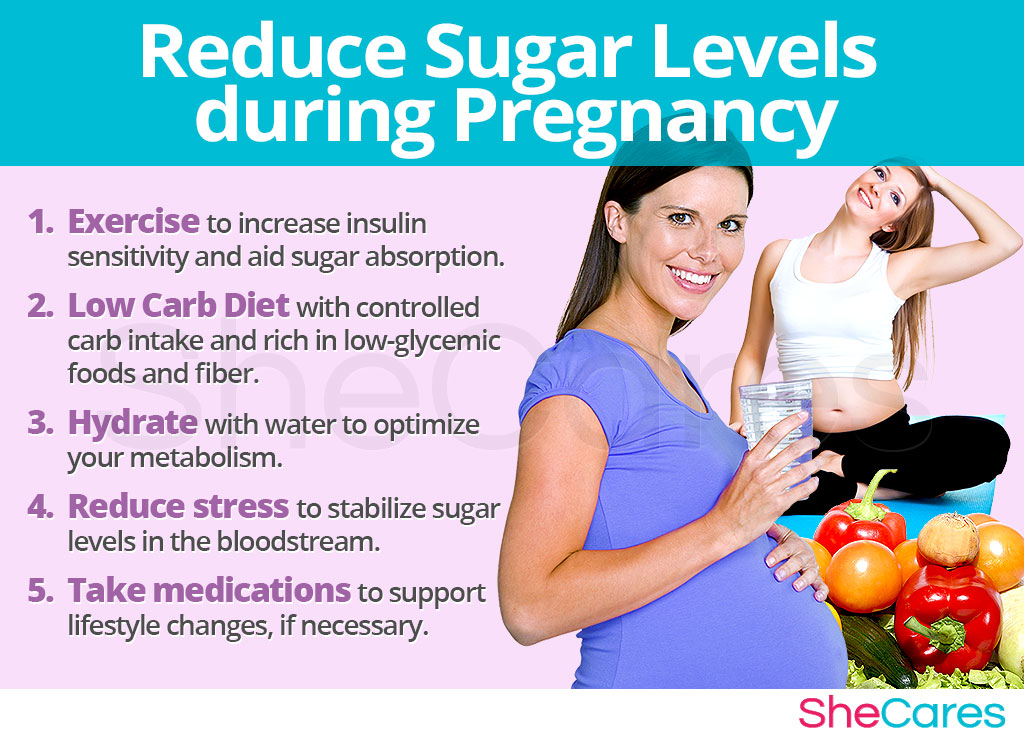
Manage Diabetes during Pregnancy
During the nine months of pregnancy, your body will undergo numerous changes, both physical and psychological. So, it is essential to keep up with regular check-ups in order to ensure that any blood glucose abnormalities are promptly resolved.
Many women experience food cravings during pregnancy, which might be problematic for diabetics trying to maintain stable sugar levels. It is important to remember that although you are growing a human being in your womb, your calorie intake should only increase by 300 a day. Continuing with low-impact physical activity and eating good protein sources, complex carbohydrates, and fiber-rich fruits and vegetables will help you prevent sugar level going high or low, prevent unhealthy weight gain, and provide sufficient nutrition for you and the baby.
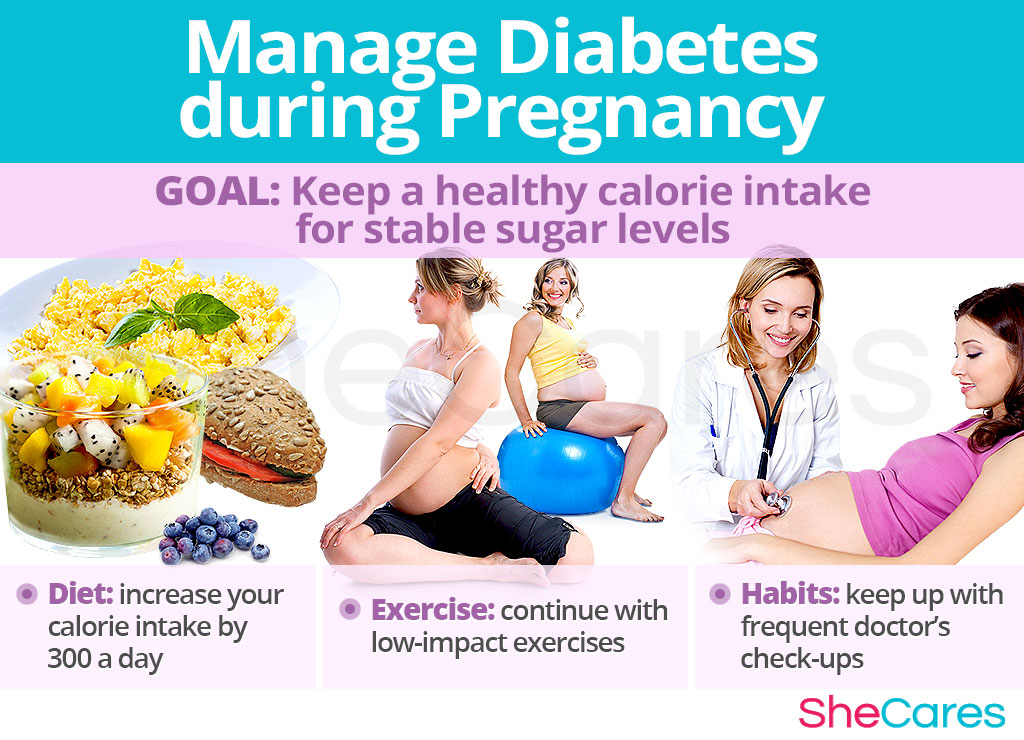
Key Takeaway
Living with diabetes mellitus is not easy, and it involves numerous - sometimes difficult- life changes, particularly when preparing for pregnancy. The best outcomes are achieved when the pre-conception action plans, such as maintaining stable blood sugar level with proper diet, exercising regularly, and taking prenatal vitamins and Macafem to improve fertility, are introduced a few months prior to conceiving. With patience and dedication, you can have a baby with diabetes and enjoy a long and healthy life.
Sources
- Alkon, C. (2010). Balancing Pregnancy with Pre-existing Diabetes. Healthy Mom, Healthy Baby. New York: Demos Medical Publishing. Available from Google Books
- American Diabetes Association. (2017). Diabetes Superfoods. Retrieved November 8, 2017 from http://www.diabetes.org/food-and-fitness/food/what-can-i-eat/making-healthy-food-choices/diabetes-superfoods.html
- American Diabetes Association. (2005). Diabetes Management and Exercise in Pregnant Patients with Diabetes. Retrieved November 8, 2017 from http://clinical.diabetesjournals.org/content/23/4/165
- Diabetologia. (2015). History of infertility and risk of type 2 diabetes mellitus: a prospective cohort study. Retrieved November 8, 2017 from https://www.ncbi.nlm.nih.gov/pmc/articles/PMC4416980/
- Frontiers in Neuroendocrinology. (2010). The pros and cons of phytoestrogens. Retrieved November 8, 2017 from https://www.ncbi.nlm.nih.gov/pmc/articles/PMC3074428/
- London Journal of Primary Care. (2015). Infertility in a young woman with Type 2 diabetes. Retrieved November 8, 2017 from https://www.ncbi.nlm.nih.gov/pmc/articles/PMC4494467/
- March of Dimes. (2015). Preexisting diabetes. Retrieved November 8, 2017 from https://www.marchofdimes.org/complications/preexisting-diabetes.aspx
- National Institute of Diabetes and Digestive and Kidney Diseases. (2017). Pregnancy if you have diabetes. Retrieved November 8, 2017 from https://www.niddk.nih.gov/health-information/diabetes/diabetes-pregnancy
- Reproductive Biology and Endocrinology. (2011). Menarche delay and menstrual irregularities persist in adolescents with type 1 diabetes. Retrieved November 8, 2017 from https://www.ncbi.nlm.nih.gov/pmc/articles/PMC3100251/
- Women's Health. (2009). Fertility issues in women with diabetes. Retrieved November 8, 2017 from https://www.ncbi.nlm.nih.gov/pubmed/19863473
